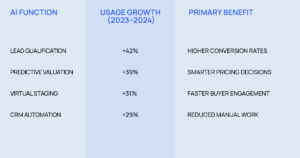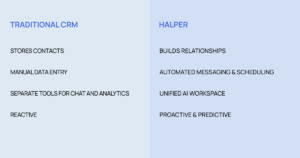
Adapted from Halper Blog and republished on Alpa with additional insights for real estate professionals.
Your phone buzzes. Again. A new inquiry, a showing rescheduled, three follow-ups you still haven’t answered. For most agents, that’s just a regular Tuesday. Between listings, calls, and admin chaos, the day slips away before the real work even starts.
Artificial intelligence is quietly changing that. In 2025, AI tools for real estate aren’t just about saving time — they’re rewriting how agents operate, communicate, and close. From predictive analytics to smart CRMs, AI has become the new foundation of modern real estate.
This playbook looks at how AI actually works in the industry, where it brings the biggest results, and which tools — including Halper, an AI business manager built for real estate pros — are leading the shift.
What AI Means in Real Estate
AI in real estate uses machine learning and big data to handle everyday work more efficiently. It helps predict prices, automate follow-ups, and personalize client communication — often faster than a human team could.
According to Statista, global investment in real estate AI software topped $6.2 billion in 2024 and is on track to reach $12.5 billion by 2027. Agents using AI say they save around 10 hours a week, close deals 25% faster, and convert more leads.
The goal isn’t to replace agents — it’s to make their jobs smarter and smoother.
Two Sides of AI: Creative and Analytical
AI in real estate falls into two main camps: Generative AI and Analytical AI. Think of them as creativity and precision working side by side.
Generative AI helps create content that sells. It powers tools for virtual staging, listing descriptions, and photo enhancement. Platforms like Virtual Staging AI and REimagineHome can turn an empty room into a beautifully staged home in seconds. Services like Write.homes generate SEO-friendly listing text that gets more clicks.
Agents using generative AI report up to 60% higher engagement and 35% faster property turnover.
Analytical AI, on the other hand, is all about insight. Tools such as HouseCanary, Reonomy, and Offrs use data to predict pricing trends, target buyers, and forecast market shifts. CAPE Analytics found that valuation accuracy improves by nearly 8% with AI-driven models.
Together, these two types of AI help agents market creatively — and sell strategically.
The AI Boom in Real Estate
AI adoption isn’t just accelerating — it’s becoming the industry standard. A 2024 Delta Media survey found that 75% of top U.S. brokerages now use AI for tasks like workflow automation, client behavior prediction, and price analysis.
Here’s how usage grew between 2023 and 2024:

The message is clear: what started as an advantage has now become a baseline.
The 15 Best Real Estate AI Tools in 2025
Here’s a quick look at the top AI tools reshaping real estate this year — from automation and marketing to analytics and visualization.
| Tool | Best For | Key Feature | Rating | Starting Price |
|---|---|---|---|---|
| Halper | All-in-one automation | AI CRM, messaging, and scheduling | ⭐ 4.9/5 | $39/month |
| TopProducer | Relationship management | Predictive follow-ups | ⭐ 3.1/5 | $179/month |
| Offrs | Seller prediction | Neighborhood analytics | ⭐ 4.7/5 | $399/month |
| Ylopo | Marketing automation | Retargeting and chatbots | ⭐ 3.0/5 | Custom |
| Virtual Staging AI | Listing visuals | Realistic digital staging | ⭐ 4.4/5 | $16/month |
| REimagineHome | Renovation previews | AI-generated design ideas | ⭐ 5/5 | $14/month |
| HouseCanary | Pricing and forecasting | Predictive analytics | ⭐ 4.2/5 | $19/month |
| Structurely | Lead engagement | Conversational chatbot | ⭐ 4.2/5 | $499/month |
| Reonomy | Commercial insights | Ownership and property data | ⭐ 4.0/5 | $400/month |
| Sidekick | Daily automation | AI reminders and scheduling | ⭐ 4.9/5 | $25/month |
| Midjourney | 3D visuals | Text-to-image rendering | ⭐ 4.4/5 | $10/month |
| Deal Machine’s Alma | Investor prospecting | Smart lead scoring | ⭐ 3.3/5 | $99/month |
| RealGrader | Online visibility | Reputation management | ⭐ 3.6/5 | $81/month |
| Scout | Lead capture | Automated segmentation | ⭐ 4.8/5 | $200/month |
| Write.homes | Listing descriptions | SEO content generation | ⭐ 5/5 | $17.50/month |
Sources: G2, Capterra, Product Hunt, Trustpilot (2025).
Why Halper Tops the List
Unlike typical CRMs, Halper isn’t just a data tool — it’s an AI business manager designed for real estate professionals. It connects communication, scheduling, and analytics into one intelligent workspace.
What makes it stand out:
• Automates WhatsApp, Instagram, and Messenger messages
• Schedules viewings and prevents no-shows
• Tracks analytics and generates reports automatically
• Combines CRM, chat, and insights in one place
Agents using Halper see results fast:
• 2x faster response times
• 37% fewer missed appointments
• 30% weekly time savings
“Halper feels like a full-time assistant who never sleeps,” says David P., an independent broker.
Here’s how Halper stacks up against traditional CRMs:
Why AI Doesn’t Replace Agents — It Frees Them
AI isn’t here to take over. It’s here to handle the repetitive stuff so people can focus on what actually matters — empathy, negotiation, trust.
Chatbots like Structurely or automation systems like Halper let agents respond instantly, even after hours. Buyers get quick answers; agents get their evenings back.
Real estate is still a people business. AI just gives professionals the time to act like it.
What’s Next
AI in real estate is evolving fast — soon it’ll include voice commands, IoT data, and predictive contract tools. But the goal remains the same: work less, close faster, and build stronger client relationships.
To see how automation fits into everyday business, check out Halper Blog.
With Halper managing your workflow, you don’t just sell smarter — you sell freer.
Follow Halper:
Instagram
TikTok
Facebook
LinkedIn
YouTube
X / Twitter
Source: Adapted from Halper Blog. Edited and republished by Alpa Marketing.


